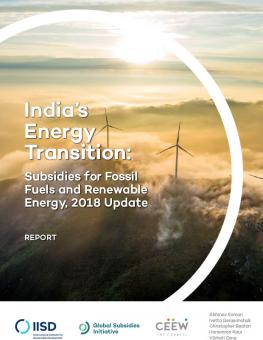
India's Energy Transition: Subsidies for Fossil Fuels and Renewable Energy, 2018 Update
How have India’s energy subsidy policies changed since 2016? Have they become more or less aligned with India’s desired energy future? How have India’s energy subsidy policies changed since 2016? Have they become more or less aligned with India’s desired energy future?
Pricing drives economic decision making, and subsidies (along with taxation) are one of the key tools that governments use to influence prices, and through them investment decisions and consumer behaviour.
This update highlights the most significant developments in the dynamic domain of India’s energy subsidy policies in FY 2017 and explores the role that subsidies play with respect to four themes: energy access; the role of coal; prospects for renewables; and a transport sector transition. It finds that the total value of quantified energy subsidies has declined from INR 2,15,974 crore (USD 35.7 billion) in FY2014 to INR 1,51,484 crore (USD 23 billion) in FY2017. Subsidies to fossil fuels have declined over this period, while subsidies to renewables and electric vehicles (EVs) have increased. However, the absolute value of subsidies to fossil fuels is much greater than those to renewables and EV.
You might also be interested in
Increased Support Needed to Achieve India's Clean Energy Goals
India is on track to achieve many of its 2030 clean energy goals but needs to step up government support measures to accelerate the deployment of offshore wind, electric vehicles, and green hydrogen, according to a new report.
India Faces Clean Energy Challenges as Energy Demand Soars and Global Fossil Fuel Subsidies Rise
New research finds the global energy crisis and increasing energy demand have pushed India's energy subsidies to a 9-year high.
G20 energy ministers call for cooperation on nuclear energy & low-emission hydrogen
The Group of 20 energy ministers' meeting concluded in Goa on July 22, 2023, with the final summary failing to include language on the phase-down of unabated fossil fuels.
Implementing Solar Irrigation Sustainably
This guidebook provides recommendations to state policy-makers on how they can implement solar irrigation models, particularly decentralized solar plants for irrigation under the PM-KUSUM scheme, effectively and sustainably.